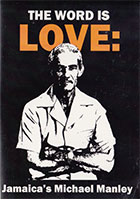
The Word is Love: Jamaica’s Michael Manley 2011
Distributed by Third World Newsreel, 545 Eighth Avenue, Suite 550, New York, NY 10018; 212-947-9277
Produced by Daisy Grant, Jerry Craig
Directed by Richard Audley Vaughan
DVD , color and b&w, 205 min.
Middle School - General Adult
Biography, Government, History, Labor Movement, Politics
Date Entered: 10/19/2016
Reviewed by Monique Threatt, Indiana University, Herman B Wells Library, Bloomington, IN“…since Michael Manley, Jamaicans of every social class have a new understanding of their own self-worth, and their own possibilities.”
Filmmaker Vaughan’s ambitious feature-length documentary details the life and career of Jamaica’s beloved fourth Prime Minister Michael Manley (1972-1980, 1989-1992). Told primarily from the perspective of family, friends, and political allies, Manley ascends from being a journalist, to an official for the National Worker’s Union, leader of the People’s National Party, leader of the Opposition, and soon Prime Minister. His reverence as a national figure stems from his fastidious dedication to improve socio-economic conditions for the working poor, and domestic. He is analogically the Jamaican people’s “Joshua, tearing down the walls of Jericho,” defeating colonial pragmatism, inequality, and injustice. (Can anyone spare a Superman cape?)
Born in Saint Andrew Parish, Jamaica, to Norman Washington Manley (co-founder of Jamaica’s People’s National Party), and Edna Manley (dubbed the mother of Jamaican art), Michael’s childhood is a canopy of privilege, creativity, and a loyal sense of duty to country. While attending school in England, Manley’s Jamaican heritage and golden brown skin attracts unwarranted criticism and bullying. He returns to Jamaica with a determination to uplift the Jamaican people, its rich culture, and resources.
Throughout his political career, Manley’s goal is to fight for the working class poor. Under his governance as a democratic socialist, he implements policies for all workers to receive minimum wage, free education, and health care. He sets about improving youth and adult literacy, as well as providing equitable land grants to small farmers, and much more. His reportedly charismatic ways allow him to easily relate to, and be accepted by the rich, middle-class, and poor. Despite international scrutiny, he is able to establish relationships with foreign leaders such as Nyerere (Tanzania), Palme (Sweden), Trudeau (Canada), and Castro (Cuba).
Manley’s legacy is immeasurable. His humanitarian and political contributions result in a prideful Jamaican people for the 20th century, and beyond. He is not a perfect man, having been married five times, and causing controversy with his alliances with Castro, but his love for the Jamaican people is clearly evident in this film.
Recommended with reservations for public libraries. Although this is a very important and historic film, it contains repetitive and inaudible interviews, and is not a good candidate for academic classroom use. In contrast to other reviewers who applaud this film as having stimulating interviews, I disagree. This documentary relies heavily on monotone oral stories, and lacks enough external archival resources to break the monotony of the constant talking heads. However, there is room for the filmmaker to improve upon this production to possibly create shorter versions for schools. Includes archival footage and photographs.